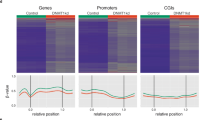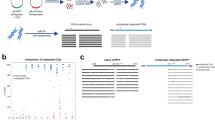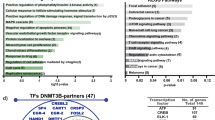Abstract
Loss of heterozygosity on chromosome 9p21 is one of the most frequent genetic alterations identified in human cancer. The rate of point mutations of p16, a candidate suppressor gene of this area, is low in most primary tumours with allelic loss of 9p21. Monosomic cell lines with structurally unaltered p16 show methylation of the 5′ CpG island of p16. This distinct methylation pattern was associated with a complete transcriptional block that was reversible upon treatment with 5-deoxyazacytidine. Moreover, de novo methylation of the 5′ CpG island of p16 was also found in approximately 20% of different primary neoplasms, but not in normal tissues, potentially representing a common pathway of tumour suppressor gene inactivation in human cancers.
This is a preview of subscription content, access via your institution
Access options
Subscribe to this journal
Receive 12 print issues and online access
$209.00 per year
only $17.42 per issue
Buy this article
- Purchase on Springer Link
- Instant access to full article PDF
Prices may be subject to local taxes which are calculated during checkout
Similar content being viewed by others
References
Fearon, E.R. & Vogelstein, B. A genetic model for colorectal tumorigenesis. Cell 61, 759–767. 1990.
Weinberg, R.A. Tumor suppressor genes. Science 254, 1138–1146. 1991.
Nowell, P.C. Clonal evolution of tumor cell populations. Science 194, 23–28. 1976.
Sidransky, D. et al. Clonal origin of bladder cancer. New Engl J. Med. 326, 737–740. 1992.
Sidransky, D. et al. Clonal expansion of p53 mutant cells is associated with brain tumour progression. Nature 355, 846–847. 1992.
Sidransky, D. et al. Identification of ras oncogene mutations in the stool of patients with curable colorectal tumors. Science 256, 102–105. 1992.
Sidransky, D. et al. Identification of p53 gene mutations in bladder cancers and urine samples. Science 252, 706–709. 1991.
Mao, L., Hruban, R.H., Boyle, J.O., Tockman, M. & Sidransky, D. Detection of oncogene mutations in sputum precedes diagnosis of lung cancer. Cancer Res. 54, 1634–1637. 1994.
Mao, L. et al. Microsatellite alterations as clonal markers in the detection of human cancer. Proc. natn. Acad. Sci. U.S.A. 91, 9871–9875. 1994.
Cairns, P., Shaw, M.E. & Knowles, M.A. Initiation of bladder cancer may involve deletion of a tumor suppressor gene on chromosome 9. Oncogene 8, 1083–1085. 1993.
Van der Riet, P. et al. Frequent loss of chromosome 9p21-22 early in head and neck cancer progression. Cancer Res. 54, 1156–1158. 1994.
Olopade, O.I. et al. Mapping of the shortest region of overlap of deletions of the short arm of chromosome 9 associated with human neoplasia. Genomics 14, 437–443. 1992.
Merlo, A., Gabrielson, E., Askin, F. & Sidransky, D. Frequent loss of chromosome 9 in human primary non-small cell lung cancer. Cancer Res. 54, 640–642. 1994.
Merlo, A. et al. Homozygous deletion on chromosome 9p and loss of heterozygosity on 9q, 6p, and 6q in primary human small cell lung cancer. Cancer Res. 54, 2322–2326. 1994.
Kamb, A. et al. A cell cycle regulator potentially involved in genesis of many tumor types. Science 264, 436–440. 1994.
Nobori, T. et al. Deletions of the cyclin-dependent kinase-4 inhibitor gene in multiple human cancers. Nature 368, 753–756. 1994.
Serrano, M., Hannon, G.J. & Beach, D. A new regulatory motif in cell-cycle control causing specific inhibition of cyclin D/CDK4. Nature 366, 704–707. 1993.
Sherr, C.J. Mammalian G1 cyclins. Cell 73, 1059–1065. 1993.
Hussussian, C.J. et al. Germline p16 mutations in familial melanoma. Nature Genet. 8, 15–21. 1994.
Kamb, A. et al. Analysis of the p16 gene (CDKN2) as a candidate for the chromosome 9p melanoma susceptibility locus. Nature Genet. 8, 22–26. 1994.
Caldas, C. et al. Frequent somatic mutations and homozygous deletions of the p16 (MTS1) gene in pancreatic adenocarcinoma. Nature Genet. 8, 27–32. 1994.
Mori, T. et al. Frequent somatic mutation of MTS1/CDK4I (multiple tumor suppressor/cyclin-dependent kinase 4 inhibitor) gene in esophageal squamous cell carcinoma. Cancer Res. 54, 3396–3397. 1994.
Serrano, M., Gomez-Lahoz, E., DePinho, R.A., Beach, D. & Bar-Sagi, D. Inhibition of ras-induced proliferation and cellular transformation by p16INK4. Science 267, 249–252. 1995.
Arap, W., Nishikawa, R., Furnari, F.B., Cavenee, W.K. & Huang, H-J. Replacement of the p16/CDKN2 gene suppresses glioma cell growth. Cancer Res. 55, 1351–1354. 1995.
Cairns, P. et al. Rates of p16 (MTS1) mutations in primary tumors with 9p loss. Science 265, 415–416. 1994.
Spruck, C.H. et al. p16 gene in uncultured tumours. Nature 370, 183–184. 1994.
Zhang, S.-Y. et al. Higher frequency of alterations in the p16/CDKN2 gene in squamous cell carcinoma cell lines than in primary tumors of the head and neck. Cancer Res. 54, 5050–5053. 1994.
Xu, L. et al. Mutational analysis of CDKN2 (MTS1/p16INK4) in human breast carcinomas. Cancer Res. 54, 5262–5264. 1994.
Okamoto, A. et al. Mutations and altered expression of genes regulating the cell cycle G1 checkpoint in human cancer. Proc. natn. Acad. Sci U.S.A. 91, 11045–11049. 1994.
Issa, J-P. J. et al. Methylation of the oestrogen receptor CpG island links aging and neoplasia in human colon. Nature Genet. 7, 536–540. 1994.
Herman, J.G. et al. Silencing of the VHL tumor suppressor gene by DNA methylation in renal carcinoma. Proc. natn. Acad. Sci. U.S.A. 91, 9700–9704. 1994.
Bird, A.P. CpG-rich islands and the function of DNA methylation. Nature 321, 209–213. 1986.
Bird, A. The essentials of DNA methylation. Cell 70, 5–8. 1992.
Migeon, B.R. Insights into X chromosome inactivation from studies of species variation, DNA methylation and replication, and vice versa. Genet. Res. 56, 91–98. 1990.
Li, E., Beard, C. & Jaenisch, R. Role for DNA methylation in genomic imprinting. Nature 366, 362–365. 1993.
Sakai, T. et al. Allele-specific hypermethylation of the retinoblastoma tumor-suppressor gene. Am. J. hum. Genet. 48, 880–888. 1991.
Latif, F. et al. Chromosome 3p deletions in head and neck carcinomas: Statistical ascertainment of allelic loss. Cancer Res. 52, 1451–1456. 1992.
Mao, L. et al. A novel p16INK4A transcript. Cancer Res. (in the press).
Antequera, F., Boyes, J. & Bird, A. High levels of de novo methylation and altered chromatin structure at CpG islands in cell lines. Cell 62, 503–514. 1990.
Knudson, A.G. Mutation and cancer: Statistical study of retinoblastoma. Proc. natn. Acad. Sci. U.S.A. 68, 820–823. 1971.
de Bustros, A. et al. The short arm of chromosome 11 is a “hot spot” for hypermethylation in human neoplasia. Proc. natn. Acad. Sci. U.S.A. 85, 5693–5697. 1988.
Baylin, S.B. et al. Abnormal pattern of DNA methylation in human neoplasia: Potential consequences for tumor progression. Cancer Cells 3, 383–390. 1991.
Rygaard, K., Sorensen, G.D., Pettengill, O.S., Cate, C.C. & Spang-Thomsen, M. Abnormalities in structure and expression of the retinoblastoma gene in small cell lung cancer cell lines and xenografts in nude mice. Cancer Res. 50, 5312–5317. 1990.
Vogelstein, B. et al. Genetic alterations during colorectal-tumor development. New Engl. J. Med. 319, 525–532. 1988.
Feinberg, A.P. & Vogelstein, B. A technique for radiolabeling DNA restriction endonuclease fragments to high specific activity. Annal. Biochem. 137, 266–267. 1984.
Van der Riet, P. et al. Progression of basal cell carcinoma through loss of chromosome 9q and inactivation of a single p53 allele. Cancer Res. 54, 25–27. 1994.
Chomczynski, P. & Sacchi, N. Single-step method of RNA isolation by guanidium thiocyanate-phenol-chloroform extraction. Analyt. Biochem. 162, 156–159. 1987.
Author information
Authors and Affiliations
Rights and permissions
About this article
Cite this article
Merlo, A., Herman, J., Mao, L. et al. 5′ CpG island methylation is associated with transcriptional silencing of the tumour suppressor p16/CDKN2/MTS1 in human cancers. Nat Med 1, 686–692 (1995). https://doi.org/10.1038/nm0795-686
Received:
Accepted:
Issue Date:
DOI: https://doi.org/10.1038/nm0795-686
This article is cited by
-
HDAC5 modulates SATB1 transcriptional activity to promote lung adenocarcinoma
British Journal of Cancer (2023)
-
Clinical significance of SPOP and APC gene alterations in colorectal cancer in Indian population
Molecular Genetics and Genomics (2023)
-
Potential biomarkers for immunotherapy in non-small-cell lung cancer
Cancer and Metastasis Reviews (2023)
-
Effects of inhalable gene transfection as a novel gene therapy for non-small cell lung cancer and malignant pleural mesothelioma
Scientific Reports (2022)
-
Age-specific oncogenic pathways in head and neck squamous cell carcinoma - are elderly a different subcategory?
Cellular Oncology (2022)



